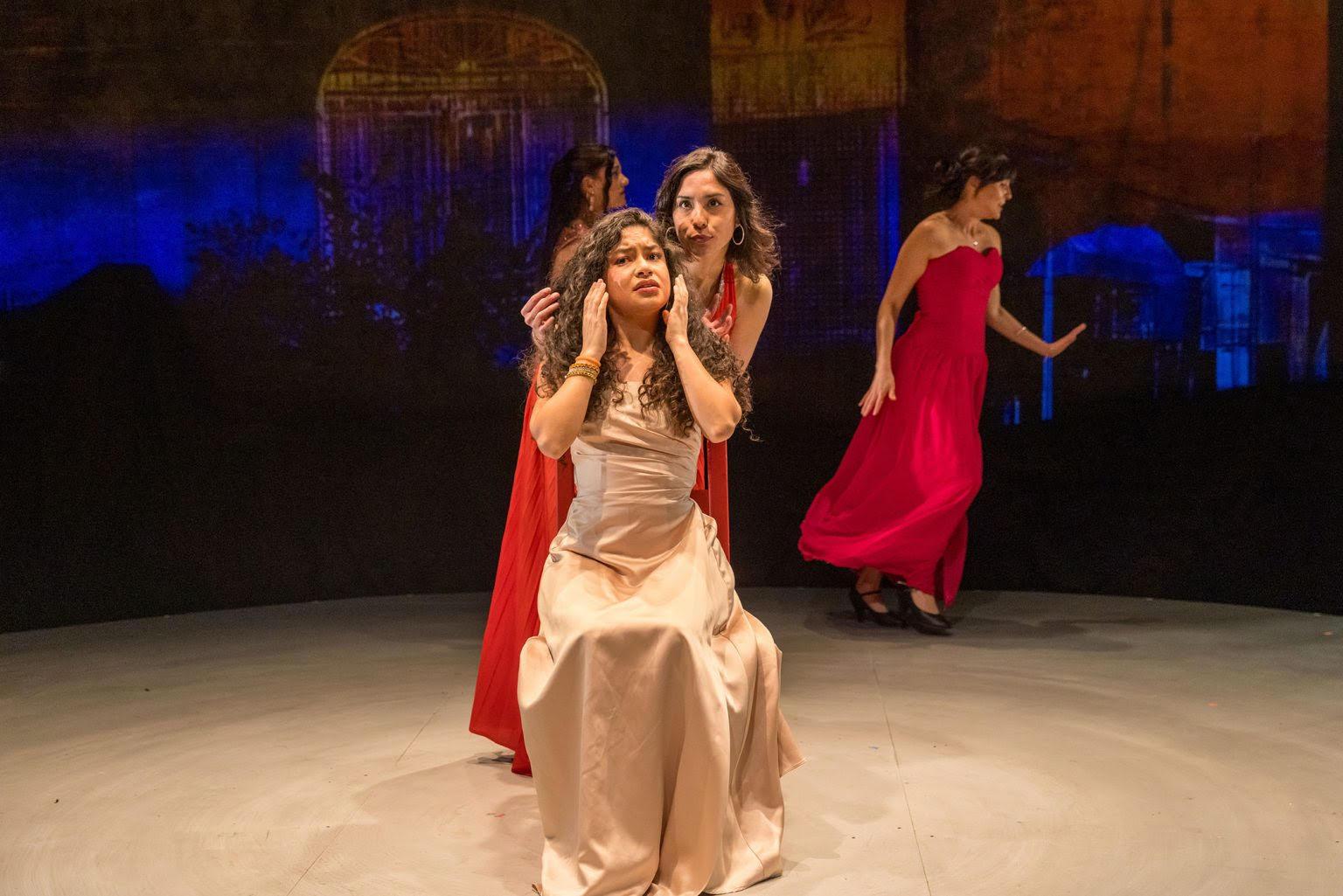‘Just Like Us’ explores Latino experiences of, challenges attitudes on immigration
Pictured is the cast of the theatre production “Just Like Us” performing on stage. This adaptation of a true story will run until May 18 under the Latino Theater Company at the Los Angeles Theatre Center. (Courtesy of Grettel Cortes Photography)
By Izzy De Leon
May 18, 2025 10:07 a.m.
Through the lens of immigration, the theater production “Just Like Us” highlights the coming-of-age stories of four Latina girls in Denver.
This rendition of a true story is running until May 18 under the Latino Theater Company at the Los Angeles Theatre Center. Based on Helen Thorpe’s eponymous book that follows four girls from their senior year of high school, “Just Like Us” delves into how their varying legal statuses – as two characters have permanent legal status and two do not – impact their everyday lives, opportunities and relationships. Featuring seven UCLA alumni among the cast and crew and directed by UCLA School of Theater, Film and Television faculty member Fidel Gomez, the just-over-two-hour play humanizes those stripped of identity, Gomez said.
“It becomes this faceless mass of people that are not given any kind of humanity,” Gomez said. “Behind all those numbers are human beings. … (The show) was really about taking the story of these four girls and making them real people.”
[Related: Youth-oriented film festival inspires creativity, mental health awareness]
Actor Oscar Emmanuel Fabela – who plays multiple characters – said the play shows how nothing is truly one-sided, especially this topic. The nonfiction play, written by Karen Zacarías, is topical in the current political climate, Fabela said. Zacarías’ ability to present the girls in a relatable way allows audiences to become more aware of realities that may not be their own, said lead actress Noelle Franco, who plays Clara.
Franco graduated from the UCLA master of fine arts in 2022 and said she sees theater as an opportunity to empathize with other people’s lives. She said the medium is about empathy, considering other points of view and invoking emotion. The play forces audiences to engage with and confront current issues such as deportation and the separation of families, she added.
“I hope that audiences and people see themselves through the play, or some audience members maybe get new perspectives,” Franco said. “The play is about deep relationships. … These girls – they’re not just friends. They become sisters.”
Newt Arlandiz, a member of Franco’s cohort who plays Yadira, said she connected with the show as an immigrant who has overcome obstacles similar to some of those that the show’s protagonists face. The core message, she said, is that immigration is not a bad thing – and the play opens a conversation onstage and addresses common questions people have about the topic.
“I at least want them (audiences) to get out of the show and start thinking about other possibilities,” Arlandiz said. “I know we might not change everyone’s minds, but if we can light the fire, that would be great.”
Attempting to capture multiple perspectives on immigration, director, actor and writer Gomez said one scene in the show depicts the characters’ responses to an anti-immigration rally. Gomez said he believes the media often only portrays rallies and political developments from one perspective, whereas this scene shows the girls’ reactions side by side with the depictions of those rallying.
“(When) you’re watching other political rallies, they’re not showing how it makes the people they’re talking about feel,” Gomez said. “I thought it was interesting to be able to see the people that have been spoken about directly reacting to what is being said about them.”
In addition to the majority Latino cast, almost all of the show’s design team was born outside of the United States, Gomez said. Even though they are not all Latino, the team members understand the challenges that come with adapting to a new culture and the perspectives of being made to feel like outsiders – all of which contribute to the show’s design, he said.
As a UCLA alumnus, Fabela said working at a theater with fellow Bruins has created a safe, healing place for him. Franco, who graduated as part of a class predominantly consisting of people of color, said her time at UCLA was a refreshing experience.
“It is an honor to stand next to and work with Oscar and Newt, where we all have a language of training that we can speak from,” Franco said. “There’s a homecoming to it. It feels like a full-circle kind of moment.”
[Related: UCLA alumnus centers solo play “Lymphomaniac” on cancer story, non-linear healing]
The theatre center is also hosting Wednesday matinees for LA students, providing an opportunity for young people to see stories that they might relate to, Arlandiz said. Seeing students who were predominantly Latino or from other nonwhite backgrounds during the matinee helped further the impact of relationship building and displayed the connections this play exemplifies, Franco said.
“To have this kind of connection in the audience of younger people to us was glorious. I mean, you think for the moment, ‘Oh, this is why I do my art,’” Franco said. “We don’t need good lights, cameras in action – no, no, no: What we are actually looking for is connection.”
